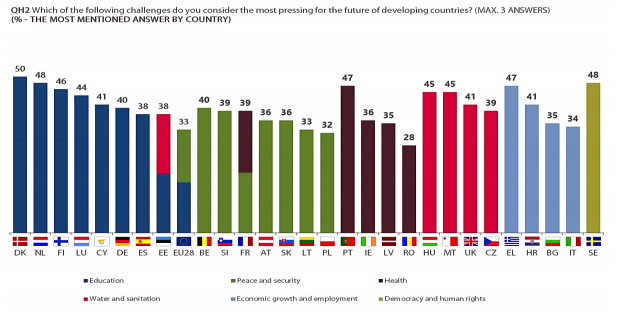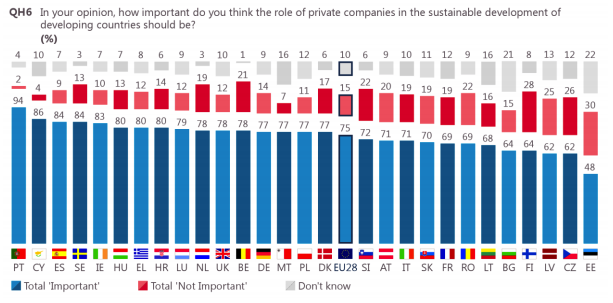Education is a development priority and the private sector has a role to play, says European public
25 October 2019
The European Commission (EC) is the executive branch of the European Union (EU), with responsibility for proposing legislation, implementing decisions and managing the day-to-day business of the EU.
The EU is a collection of 28 countries (EU28) with a combined population of 514 million and economy of $18.7 trillion. If the EU28 was a country it would be the third largest by population and second largest by economy in the world.
To support its work, the EC regularly measures public opinion in the EU28 across a broad range of policies to assess the understanding of its priorities and evaluate the success of its work. In October 2019, their annual report on development cooperation was released, the Special Eurobaromoter 494.
This is an important report—the European Union and its member states are the biggest donors of development cooperation on the planet, contributing €74.4 billion ($83 billion) in 2018. Where they lead, others are likely to follow.
Education is the most pressing challenge for the future of developing countries
Across the EU28 the issues of ‘Peace and Security’ and ‘Education’ were considered the most pressing challenges for developing countries, at 33% each; suggesting a good knowledge amongst Europeans of the vital role that education plays in sustainable development.

One-quarter of EU28 countries believe education to the ‘most pressing challenge’ for the future of developing countries—including Denmark, Germany, Spain and the Netherlands; some of the biggest donors.
Majority support for the role of the private sector in sustainable development
The report found that amongst the EU28 three-in-four people agreed that the EU should strengthen its partnership with Africa. In addition, there was a majority in favour of private investment in development cooperation—three-quarters of Europeans view the private sector as having a greater role to play in international development. In only one country of the EU28 (Estonia) was there a minority (48%) in support of private companies being involved in the sustainable development of developing countries. This was also the country with the largest percentage who responded ‘Don’t Know’ at 22%, when asked about the importance of the role of private sector companies in sustainable development.

Respondents who think investing in developing countries is important are much more likely to think the role of private companies in sustainable development is important, at 82%. This contrasts with those who think investment in developing countries is not important, where just 38% said they believe private companies play an important role in sustainable development.
British and American support for education public private partnerships in developing world
The findings of the Special Eurobarometer 494 support our commissioned research into public opinion amongst the British and American public. A representative sample of U.S. adults showed that four-fifths support the use of education public private partnerships, and four-fifths believe there should be more private providers of affordable or free education in countries where governments struggle to provide enough quality education for their citizens.
In the U.K., nine-in-ten British adults remained unaware of the global learning crisis and therefore ignorant to the fact that this lack of learning for children in low and middle-income countries is one of the root causes of conflict, terrorism, inter-generational poverty, political instability and poor health. A majority of the Britsish public are in favour of private providers of affordable or free education, and more than half support public private partnerships in countries where governments are struggling to deliver high-quality education.
The polling echoes the strategic frameworks of both countries international development agencies. The UK’s Department for International Development endorsed the use of the private sector in its 2018 education policy and United States Agency for International Development education strategy 2019-23 endorsed the use of the private sector to boost capacity, provide finance and provide solutions.
Public and private, not public or private
It’s encouraging that public opinion in the European Union, Britain and America is in favour of private sector involvement in international development issues. In particular, the recognition that the private sector has a significant contribution to make in solving the education challenges of developing nations.
At Bridge, we have always believed that the private sector has the potential to catalyse the development agenda in partnership with both governments and communities. It is increasingly clear that this is a mainstream view as the world seeks to deliver ambitious and urgent development priorities. It is never a binary choice between public or private delivery. It can, and should, only ever be about leveraging what’s best about both the public and private sectors to elevate the lives of ordinary citizens, helping them to realise their potential and in the process bringing peace and prosperity to billions.









